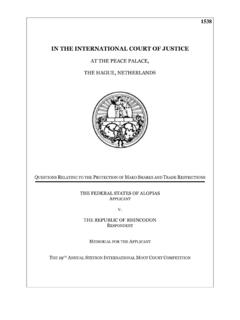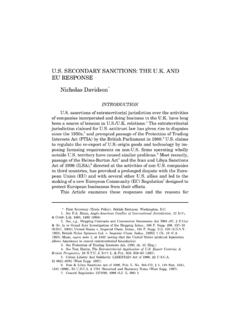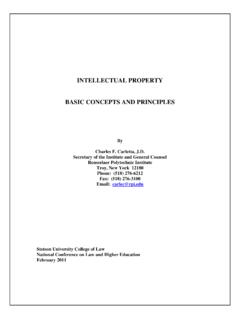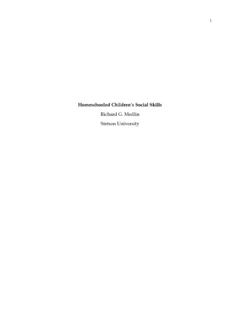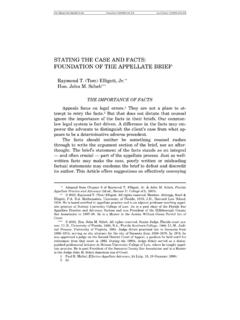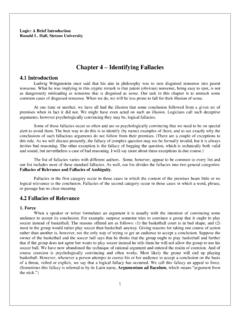Transcription of Homeschooling and the Question of Socialization Revisited
1 Homeschooling and the Question of Socialization Revisited Richard G. Medlin stetson university This article reviews recent research on homeschooled children s Socialization . The research indicates that Homeschooling parents expect their children to respect and get along with people of diverse backgrounds, provide their children with a variety of social opportunities outside the family, and believe their children s social skills are at least as good as those of other children. What homeschooled children think about their own social skills is less clear. Compared to children attending conventional schools, however, research suggest that they have higher quality friendships and better relationships with their parents and other adults. They are happy, optimistic, and satisfied with their lives.
2 Their moral reasoning is at least as advanced as that of other children, and they may be more likely to act unselfishly. As adolescents, they have a strong sense of social responsibility and exhibit less emotional turmoil and problem behaviors than their peers. Those who go on to college are socially involved and open to new experiences. Adults who were homeschooled as children are civically engaged and functioning competently in every way measured so far. An alarmist view of Homeschooling , therefore, is not supported by empirical research. It is suggested that future studies focus not on outcomes of Socialization but on the process itself. Homeschooling , once considered a fringe movement, is now widely seen as an acceptable alternative to conventional schooling (Stevens, 2003, p.)
3 90). This normalization of Homeschooling (Stevens, 2003, p. 90) has prompted scholars to announce: Homeschooling goes mainstream (Gaither, 2009, p. 11) and Homeschooling comes of age (Lines, 2000, p. 74). It has become so unremarkable (Stevens, 2003, p. 90), that one author claims, perhaps a bit too confidently, everybody knows somebody who is teaching a child at home (Gaither, 2009, p. 11). Despite this popular acceptance, Homeschooling remains controversial. For example, it has been argued (most articulately by Reich, 2005) that Homeschooling permits a kind of parental despotism (p. 113) so absolute that children may fail to develop the capacity to think for themselves (p. 114). They may grow up to be unfree (p. 114) and civically disabled (p.
4 111), and a pluralistic democracy such as ours depends upon citizens who are self-governing and self-determining persons (p. 113). According to this view, only governmental regulation that requires exposure to and engagement with .. social diversity (p. 113) can ensure protection from the civic perils of Homeschooling (Reich, 2002, p. 56). Such an argument goes well beyond the customary charge that homeschooled children are socially inept. Nevertheless, the Question so familiar to Homeschooling parents What about Socialization ? remains at the heart of the controversy. THE 2000 REVIEW In 2000, the Peabody Journal of Education published a special double issue dedicated to the topic of Homeschooling . Included in that issue was my review of research on the Socialization of homeschooled children (Medlin, 2000).
5 The research available at that time led to the following conclusions: Homeschooled children are taking part in the daily routines of their communities. They are certainly not isolated, in fact, they associate with and feel close to all sorts of people. Homeschooling parents .. actively encourage their children to take advantage of social opportunities outside the family. Homeschooled children are acquiring the rules of behavior and systems of beliefs and attitudes they need. They have good self-esteem and are likely to display fewer behavior problems than other children. They may be more socially mature and have better leadership skills than other children as well. And they appear to be functioning effectively as members of adult society. (Medlin, 2000, p.)
6 119) Are these conclusions still valid? What more have we learned? The purpose of the present article is to review research on homeschooled children s Socialization published after that featured in the 2000 review. PARENTS ATTITUDES Review of the Research Socialization may be defined as the process by which a child acquires the skills, behavior patterns, values, and motivations needed for competent functioning in the culture in which the child is growing up (Maccoby, 2007, p. 13). The importance of the parents role in the Socialization of children is (almost) universally acknowledged (Collins, Maccoby, Steinberg, Hetherington, & Bornstein, 2000; Grusec & Davidov, 2007; Maccoby, 2007; but see also Harris, 2009). Although Socialization also occurs in other contexts, Grusec and Davidov (2010) noted, there is a compelling argument that its primary context is the family (p.
7 688). When analyzing the impact Homeschooling has on a child s Socialization , therefore, finding out what Homeschooling parents think about their children s Socialization seems to be a good place to start. Miller (2000) did just that when he asked a small group of Homeschooling parents to express their understanding of Socialization as it related to home educated children (p. 8). These parents listed five advantages of Homeschooling : First, the deepened relationship with the child lets the parents be more aware of the child s needs and the influences of their environment. Second, this awareness allows the parent to be supportive of the child s social interactions, positive or negative. Third, having the children at home allows the parent to guide the child in understanding the moral implications of behavior.
8 Fourth, because of the high degree of parental involvement, parents can highlight the child s strengths and protect them from negative labeling due to weaknesses. Fifth, Homeschooling allows the parents to increase their influence through modeling good Socialization . (p. 12) Mitchell (2001) used both interviews and surveys with small groups of Homeschooling parents and found that although they did not agree on a precise definition of Socialization , they did agree that it is not a simple, one-way process. They emphasized that children make choices, assimilate and interpret their social experiences, and are active agents in their own Socialization . These parents also agreed on the essential characteristics of a socialized child (p. 211), which included honesty, respect for authority and for others, responsibility, integrity, and kindness.
9 It is perhaps worth noting that although all the parents in this study identified themselves as Christians, of the 17 characteristics they endorsed, only two believes in God and imitates God (p. 178) were explicitly religious. Mitchell concluded that the parents overall perception of their children s Socialization was positive. In a similar study, Mecham (2004) interviewed a small group of Homeschooling mothers. He reported that although the family was seen as the primary socializing agent, parents intentionally included other positive socializing agents in their children s lives (p. iv). These mothers agreed that the goals of Socialization should include teaching children to get along with people of diverse backgrounds (p. 66). They also agreed that Socialization in public schools was often negative and focused more on same-aged peer interaction rather than interacting with people of different ages (p.)
10 66). Mecham concluded, Mothers of homeschooled children believed that their children were developing adequate Socialization skills (p. 56). The National Foundation for Educational Research (United Kingdom) studied Homeschooling families need for and use of various kinds of support (Atkinson et al., 2007). The results showed that parents acknowledged the importance of providing opportunities for their children to socialize (p. x) and that they accessed a wide variety of different sources of support (p. viii) to meet this and other needs. Parents cited family and friends, local Homeschooling groups, religious and other community organizations, sports programs, and the Internet as sources of social contacts for their children. Finally, as part of a study to be discussed in more detail later (Kingston & Medlin, 2006), Homeschooling parents and the parents of children attending public schools reported their attitudes about religion and values in a brief questionnaire.
